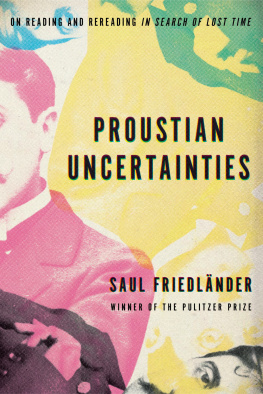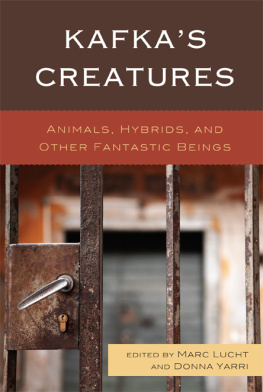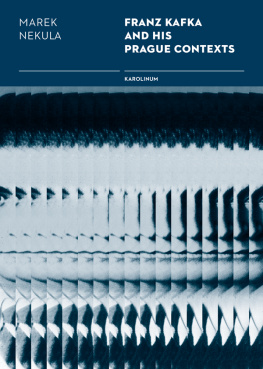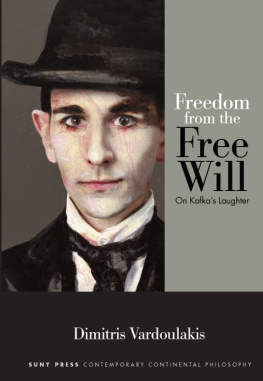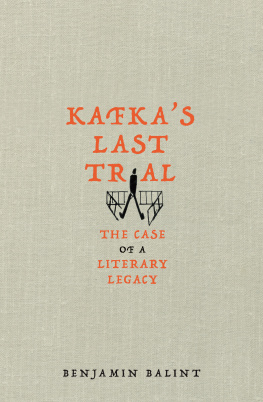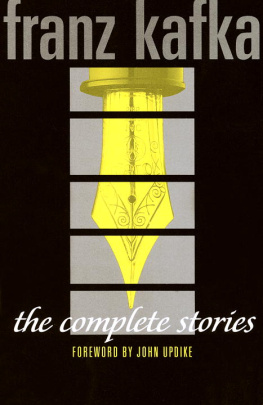FRANZ KAFKA

Franz Kafka
The Poet of Shame and Guilt

SAUL FRIEDLNDER

Published with assistance from the Louis Stern Memorial Fund.
Copyright 2013 by Saul Friedlnder. All rights reserved. This book may not be reproduced, in whole or in part, including illustrations, in any form (beyond that copying permitted by Sections 107 and 108 of the U.S. Copyright Law and except by reviewers for the public press), without written permission from the publishers.
Frontispiece: Franz Kafka posing before Kinsky Palace on the square of the old town in Prague, where his father held a shop, around 18961906 (Photo by Keystone-France/Gamma-Keystone via Getty Images).
From THE CASTLE by Franz Kafka, translated by Mark Harman, translation copyright 1998 by Schocken Books. Used by permission of Schocken Books, a division of Random House, Inc.
From THE DIARIES OF FRANZ KAFKA 19101913 by Franz Kafka, translated by Joseph Kresh, translation copyright 1948, copyright renewed 1976 by Schocken Books, and from THE DIARIES OF FRANZ KAFKA 19141023 by Franz Kafka, translated by Martin Greenberg and Hannah Arendt, translation copyright 1948, copyright renewed 1977 by Schocken Books. Used by permission of Schocken Books, a division of Random House, Inc.
From FRANZ KAFKA: THE COMPLETE STORIES by Franz Kafka, copyright 1946, 1947, 1948, 1949, 1954, 1958, 1971 by Schocken Books. Used by permission of Schocken Books, a division of Random House, Inc.
From LETTERS TO FELICE by Franz Kafka, translated by James Stern and Elizabeth Duckworth, translation copyright 1973 by Schocken Books. Used by permission of Schocken Books, a division of Random House, Inc.
From LETTERS TO FRIENDS, FAMILY AND EDITORS by Franz Kafka, translated by Richard and Clara Winston, translation copyright 1977 by Schocken Books. Used by permission of Schocken Books, a division of Random House, Inc.
From LETTERS TO MILENA by Franz Kafka, translated by Philip Boehm, translation copyright 1990 by Schocken Books. Used by permission of Schocken Books, a division of Random House, Inc.
From THE SONS by Franz Kafka, compilation copyright 1989 by Schocken Books. Originally published in DEAREST FATHER: STORIES AND OTHER WRITINGS by Franz Kafka, English translation copyright 1954, copyright renewed 1982 by Schocken Books. Used by permission of Schocken Books, a division of Random House, Inc.
From THE TRIAL by Franz Kafka, translated by Willa and Edwin Muir, translation copyright 1937, 1956, copyright renewed 1964, 1984 by Alfred A. Knopf, Inc. Used by permission of Schocken Books, a division of Random House, Inc.
Library of Congress Cataloging-in-Publication data and other information can be found on page 187.
10 9 8 7 6 5 4 3 2 1
To Orna
BerlinCharlottenburg, April 10, 1917
Dear Sir,
You made me unhappy.
I bought your Metamorphosis as a gift for my cousin. But, she is incapable of understanding the story. My cousin gave it to her mother who doesnt understand it either. The mother gave the book to my other cousin, who also didnt find an explanation. Now they have written to me: They expect me to explain the story to them as I am the doctor in the family. But I am at a loss.
Sir! I have spent months in the trenches exchanging blows with the Russians without batting an eyelid. But I could not stand losing my good name with my cousins. Only you can help me. You must do it, as you are the one who landed me in this mess. So please tell me what my cousin should think about Metamorphosis.
Most respectfully yours,
Dr. Siegfried Wolff
CONTENTS
ACKNOWLEDGMENTS
W RITING THIS BOOK has been a rather solitary experience in scholarly terms, as I am not closely acquainted with Kafka specialists, or with specialists in German literature, critical theory, and the like. I feel grateful nonetheless to quite a number of scholars in these domains whose work has helped me along: they are repeatedly mentioned throughout the text.
There is one exception, however, to this quasi-anonymity: the reader of the manuscript for Yale University Press (who agreed to share his name with me), Mark M. Anderson from Columbia University; Anderson was so generous in his comments and so attentive in his suggestions and corrections that I owe him very special thanks.
Apart from scholarly advice, I am greatly indebted to a few people for their confidence and help. To Georges Borchardt, my agent, who suggested my name to Yale University Press for the Kafka volume in the Jewish Lives series; to Ileene Smith and John Palmer, the editorial director and managing editor of the series, for their constant assistance and advice; to John Donatich, the director of the Press, for helping me out in dealing with the staggering demands submitted by the publisher owning the rights to Kafkas translations. My thanks are also addressed to Dan Heaton, my excellent copyeditor.
Much closer to home, I immensely benefited from Amir Kenans word-processing wizardry and from his outstanding editorial skills. Mainly, I couldnt have written this book, with all the doubts and the uncertainty that accompanied it, without the constant support and the frequent advice of my wife, Orna, to whom it is dedicated.
 Introduction
IntroductionI N T HE B ROTHERS K ARAMAZOV , Dostoevsky evokes a painting that shows a peasant immobile in the snow, lost in contemplation. The man is not aware of any thinking; he lets impressions accumulate in him, imperceptibly, without knowing to what end. After allowing these impressions to grow over time, he will possibly leave for Jerusalem in search of salvation or burn down his native village. Maybe, he will do both
There is some resemblance between this moujik and Franz Kafkas K. in The Castle, as he reaches the apparent end of his voyage, late on a wintry night. The village, Kafka wrote, lay under deep snow. There was no sign of the castle hill, fog and darkness surrounded it, not even the faintest glow of light suggested the large castle. K. stood for a long time on the wooden bridge that heads from the main road to the village, gazing upward into seeming emptiness.hopeless attempt to subvert the immobile life of the village and of its relations with the castle, maybe bothand maybe none of it.
We may assume from the story that K. knew of the castle and of its location before arriving and thus the seeming emptiness couldnt have misled him. And yet, this gazing into an emptiness created by a veil of fog and darkness has something mystical about it. K. may have sensed that behind the veil, an entire world, the object of his own longings, was either welcoming or rejecting him. But didnt the obscurity as such, the absence of even a flicker of light, signify that before crossing the wooden bridge into the village, K. should have abandoned all hope? A divine comedy or the mere rejection of an imposter? In Kafkas world the sacred and the profane cannot be untangled, and seeming may be the weightiest word in his writings.
I had read my first book about Franz KafkaMax Brods biography in its French translationduring my Parisian high school days, most probably in 1947. When I arrived in Israel, in 1948, and went to stay with an uncle in a village inhabited by Czech Jews (most of whom, like my uncle, had arrived from Prague in 1939), I discovered the same biographyin its original German this time. I was told on that occasion that Brod himself had been a houseguest before moving to Tel Aviv. Upon leaving he had taken chairs that he never returned. A few months later, my uncle sent me to the agricultural boarding school Ben Shemen, first established in Berlin by Siegfried Lehmann during World War I as a home for Eastern European Jewish children (officially: Jewish Peoples Home); in the thirties, it was transferred to Palestine. In 1916 Kafka discussed the Home at great length with his fiance, Felice Bauer; he encouraged her to volunteer for work with the youngsters in Lehmanns institution. And, Kafka met Dora Diamant, his last companion, in Mritz on the Baltic Sea in 1923, when she was working at a summer camp for the Homes children and he was vacationing nearby.
Next page



